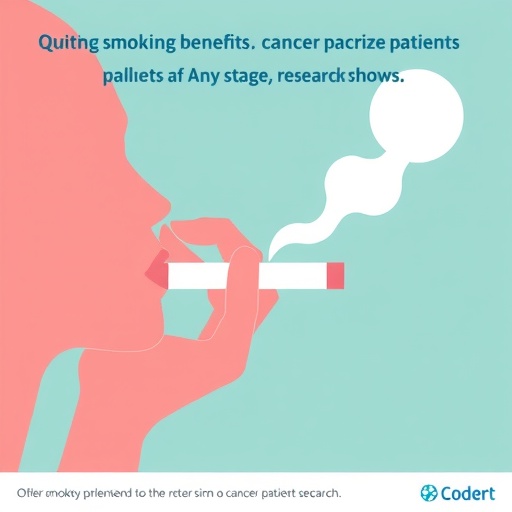A groundbreaking new study from Washington University School of Medicine in St. Louis challenges enduring misconceptions surrounding smoking cessation in cancer patients. Despite the pervasive notion that quitting smoking post-cancer diagnosis yields minimal benefit—especially for those facing advanced-stage disease—the latest research unequivocally demonstrates substantial survival benefits tied to cessation, even after treatment initiation. The results, published in the Journal of the National Comprehensive Cancer Network, reveal that cancer patients who quit smoking live significantly longer than those who continue, with the most pronounced gains observed in individuals battling late-stage malignancies.
Approximately one-quarter of cancer patients in the United States are active smokers at diagnosis, and alarmingly, many persist in smoking during their cancer treatment regimen. This entrenched behavior has historically been rationalized by a fatalistic clinical outlook that views smoking cessation at this juncture as futile. Contradicting this fatalism, the study led by Dr. Li-Shiun Chen, a professor of psychiatry, and her team underscores that quitting smoking during treatment can nearly double survival times in patients with advanced tumors. These findings provide compelling evidence that integrates tobacco cessation into oncological care as a crucial therapeutic pillar.
Dr. Chen’s research was conducted at the Siteman Cancer Center, where an innovative cessation program is intricately woven into patients’ overall cancer care plans, facilitating access by removing logistical barriers such as travel or fragmented care coordination. This integrative model offers patients an array of cessation supports, including counseling, digital health interventions, and pharmacotherapy, systematically embedded within oncology clinical workflows. By leveraging electronic health record prompts and multidisciplinary care teams, the program has raised cessation rates among cancer patients well beyond conventional success metrics.
The observational study tracked 13,282 adults receiving outpatient oncology care over a six-month enrollment period, with smoking status recorded at baseline and cessation monitored follow-up. Among the 1,725 self-reported smokers, approximately 20% successfully quit within six months. Longitudinal analysis revealed that two-year survival probability rose from 74% in continuing smokers to 85% in quitters, a statistically and clinically significant divergence pointing to the life-extending power of tobacco abstinence even after diagnosis.
Remarkably, the survival benefit was most substantial in patients with stage 3 or 4 cancers. For these individuals, quitting smoking translated into an extension of median survival from 210 days for ongoing smokers to 540 days—nearly one additional year of life expectancy. This paradigm-shifting data confronts both patient and clinician fatalism, illustrating that it is never too late to intervene on tobacco use, even amidst aggressive and advanced cancers.
Steven Tohmasi, MD, the study’s first author and a surgical resident at WashU Medicine, highlighted the psychological and motivational impact of these findings on patients. For those previously resigned to limited prognoses, the prospect of gaining a full year’s survival time provides profound hope and enhances engagement with cessation programs. It also challenges oncologists to reconsider therapeutic nihilism regarding smoking cessation, underscoring that targeted tobacco interventions are not only appropriate but potentially life-saving.
The Siteman Cancer Center’s tobacco cessation initiative is emblematic of national efforts to embed quitting support as the “fourth pillar” of cancer therapy—aligned with the standard triad of surgery, radiation, and chemotherapy. The program’s innovative use of real-time clinical data enables identification of smokers and the delivery of tailored cessation assistance seamlessly integrated into outpatient oncology settings, representing a new model for comprehensive cancer care.
Previous research by Dr. Chen’s group established the efficacy of this integrated cessation program, demonstrating higher quit rates relative to traditional approaches. Additionally, earlier data indicated that smoking abstinence may improve responses to cancer therapies and reduce mortality risk. However, some skepticism has persisted in the oncology community about prioritizing tobacco cessation during advanced cancer care, citing concerns about patient burden and limited potential for benefit, concerns now decisively refuted by this study.
This investigation’s inclusion of a diverse patient cohort across all cancer types and stages enhances its generalizability, overcoming the limitations of prior studies that often focused narrowly on specific cancers or early-stage disease. By capturing “real-world” outcomes through comprehensive electronic health record data, the study offers robust evidence that tobacco cessation confers survival advantages broadly across cancer survivorship.
Encouraged by these results, the cessation program has been scaled to multiple affiliated clinics across Missouri and Illinois, facilitated by collaborations with national networks such as EpicShare. Its proliferation illustrates both clinical feasibility and cost-effectiveness, paving the way for widespread adoption of integrative tobacco treatment protocols within oncology care systems.
Looking ahead, Dr. Chen and colleagues have secured substantial funding from the National Cancer Institute to conduct a pragmatic clinical trial comparing various tobacco cessation care models in diverse cancer survivor populations across multiple states. This trial, conducted in partnership with leading academic medical centers and veteran healthcare systems, will further elucidate optimal strategies for sustaining smoking abstinence and reducing cancer mortality on a population scale.
This transformative research dismantles outdated paradigms and establishes tobacco cessation as a critical intervention capable of markedly extending survival, improving quality of life, and reshaping cancer care for smokers nationwide. By embedding cessation support into standard oncology practice, cancer centers can offer patients both hope and tangible pathways to a longer, healthier future.
Subject of Research: People
Article Title: Smoking cessation and mortality risk in cancer Survivorship: Real-world Data From a National Cancer Institute-Designated Cancer Center
News Publication Date: 9-Oct-2025
Web References: http://dx.doi.org/10.6004/jnccn.2025.7059
Image Credits: SARA MOSER/WASHU MEDICINE
Keywords: Cancer, Cancer treatments, Life span, Life expectancy, Mortality rates
Tags: advanced-stage cancer and smokingbehavioral health in cancer carecancer patient health outcomesimpact of smoking on cancer survivalimportance of quitting smoking at any cancer stagelung cancer and smoking cessationmisconceptions about smoking and cancer treatmentquitting smoking benefits for cancer patientssmoking cessation during cancer treatmentsurvival rates for cancer patients who quit smokingtobacco cessation programs in oncologyWashington University School of Medicine research





